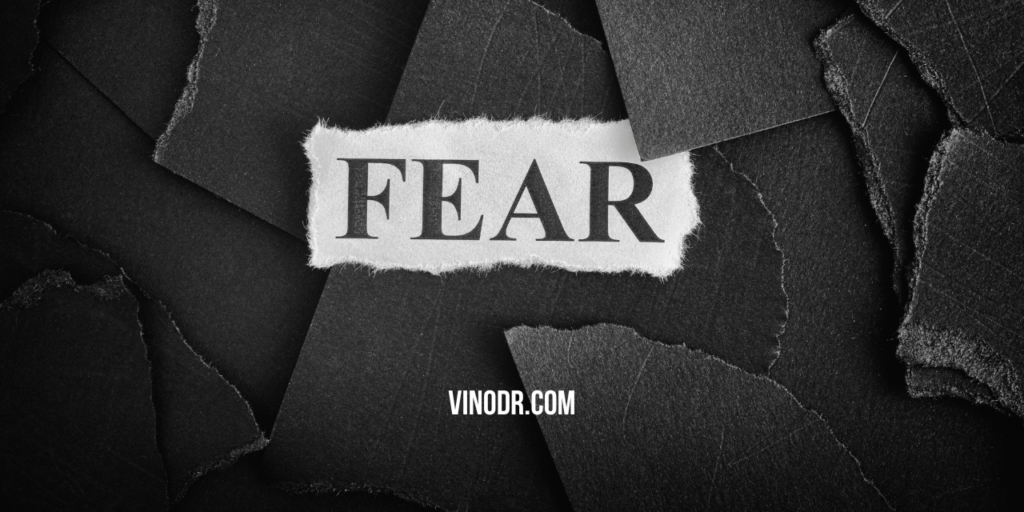FEAR Should you Fear, Fear?
How does it work?
Fear
Fear is a complex and powerful emotion that can shape our thoughts, actions, and even our entire lives. While fear can serve as a useful tool to protect us from danger and help us navigate uncertain situations, it can also be crippling and hold us back from reaching our full potential.
One of the most interesting things about fear is the way it affects our brain and body. When we experience fear, our body releases hormones such as adrenaline and cortisol, which prepare us for a fight-or-flight response. This can be helpful in certain situations, but if we are constantly in a state of fear, our body can become overwhelmed and our health can suffer.
Fear can also have a profound impact on our thinking. When we are afraid, we tend to focus on the worst-case scenarios and can become paralyzed by our own thoughts. This can lead to a cycle of anxiety and fear that can be difficult to break.
It’s important to remember that fear is a natural and normal emotion, and it’s okay to feel afraid sometimes. It’s also important to recognize that fear can be overcome with the right mindset and tools.
One way to combat fear is to confront it head-on. This might mean facing your fears directly, or it might mean taking small steps towards your goals despite your fears. For example, if you’re afraid of public speaking, you might start by speaking in front of a small group of friends or colleagues and gradually work your way up to larger audiences.
Another way to overcome fear is to focus on the present moment. When we are afraid, we tend to worry about the future or dwell on the past. By staying present and focusing on the task at hand, we can reduce our anxiety and overcome our fears.
It’s also important to remember that fear can be a teacher. When we face our fears and overcome them, we become stronger and more resilient. We learn that we are capable of more than we ever imagined, and we gain confidence in ourselves and our abilities.
Does our fight or flight response stand valid in this age?
The modern world has certainly changed the nature of the threats that we face, and many of the fears that were common in the past are less relevant in the modern age. For example, we no longer need to fear attacks by wild animals or enemy armies in the same way that people did in the past.
However, there are still many things that can cause fear in the modern world. For example, we may fear losing our jobs, becoming ill, or experiencing financial hardship. We may also fear terrorism, natural disasters, or other global crises.
While the specific fears may be different in the modern age, the basic human response to fear remains the same. Fear is a natural and necessary emotion that helps us to respond to potential threats and protect ourselves. It is important to manage our fears in a healthy way and not let them control our lives.
While the specific fears we face in the modern age may be different from those of the past, fear remains a natural and necessary part of the human experience.
How does fear work in humans?
Fear is a natural and innate response to perceived danger or threat. When we encounter a potential threat, whether it’s a physical danger or a psychological one, our body goes into a state of high alert.
The fear response is triggered by the amygdala, which is a small almond-shaped structure in the brain that is responsible for processing emotions, including fear. When the amygdala detects a potential threat, it sends a signal to the hypothalamus, which activates the sympathetic nervous system. This leads to a cascade of physiological changes, including increased heart rate, rapid breathing, sweating, and heightened awareness.
These changes are part of the body’s fight or flight response, which is designed to help us survive in dangerous situations. The fight or flight response prepares us to either fight the threat or flee from it, depending on the situation.
While fear can be a useful tool for protecting us from danger, it can also be a hindrance. When fear becomes chronic or excessive, it can interfere with our daily lives.
It’s easier said than done?
Yes, it can be easier said than done to take the steps necessary to overcome fear. Fear is a powerful emotion that can be challenging to manage, and it often takes time, effort, and practice to learn how to overcome it.
One of the reasons why it can be difficult to overcome fear is that our brains are wired to respond to threats automatically, without conscious thought. This means that even if we know intellectually that our fear is irrational or unwarranted, our body may still react to the fear response.
Overcoming fear often involves facing uncomfortable or challenging situations, which can be daunting. It can be tempting to avoid these situations or to give up when things get tough.
Does fear evoke different responses in different humans?
Yes, fear can evoke different responses in different humans. While the basic physiological response to fear, such as increased heart rate and rapid breathing, is universal, the way that individuals experience and respond to fear can vary depending on a variety of factors, including genetics, past experiences, and cultural background.
For example, some individuals may be more prone to anxiety and fear due to genetic factors, while others may have learned to fear certain situations or objects based on past traumatic experiences. Cultural background can also play a role in how fear is experienced and expressed, as different cultures may have different norms and beliefs about fear and how it should be managed.
The severity and duration of the fear response can vary depending on the individual and the situation. Some individuals may be able to quickly and easily overcome their fear, while others may experience a prolonged fear response that is difficult to manage.
Should we fear, fear?
While we should not necessarily fear, fear itself, we should be aware of how it affects us and take steps to manage it when necessary. This might involve seeking out professional help, developing coping strategies and techniques, or learning to confront our fears in a safe and controlled way.
It’s also important to remember that fear can be a powerful motivator. When harnessed correctly, fear can help us to overcome obstacles and achieve our goals. By acknowledging and embracing our fears, we can learn to use them to our advantage and grow as individuals.
Practical steps to overcome fear
Identify your fears: The first step in overcoming fear is to identify what you are afraid of. Make a list of your fears and be specific about what triggers them.
Challenge your fears: Once you have identified your fears, challenge them by questioning their validity. Ask yourself if your fears are based on reality or if they are unfounded.
Practice relaxation techniques: Relaxation techniques such as deep breathing, meditation, and yoga can help you to calm your mind and body and reduce the physical symptoms of fear.
Gradual exposure: Gradually exposing yourself to your fears in a controlled and safe way can help you to overcome them. Start with small, manageable steps and gradually work your way up to more challenging situations.
Seek support: Seeking support from friends, family, or a therapist can help you to overcome your fears. Having someone to talk to and offer encouragement can make a big difference.
Focus on the positive: Focus on positive outcomes rather than negative ones. Visualize yourself successfully overcoming your fears and achieving your goals.
Take action: Take action towards overcoming your fears by setting small, achievable goals. Celebrate your successes along the way and don’t be discouraged by setbacks.
Overcoming fear is a process and it may take time and practice. Be patient and persistent, and don’t be afraid to seek help if you need it.
Fear is a complex and powerful emotion that can have a profound impact on our lives. While it can be overwhelming and challenging to deal with, it’s important to remember that fear can be overcome with the right mindset and tools. By confronting our fears, staying present, and viewing fear as a teacher, we can overcome our fears and live the life we truly want.



